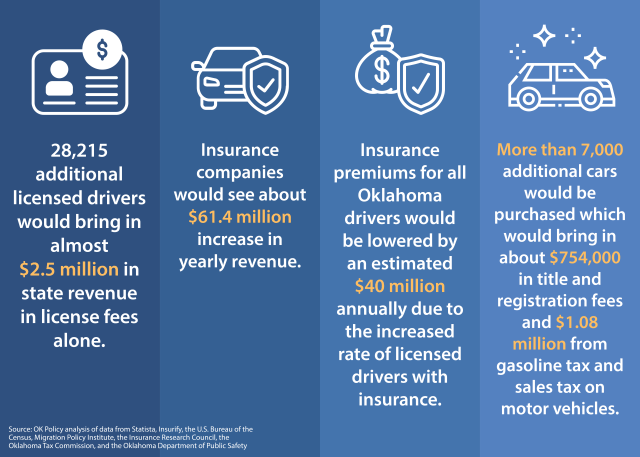Sensible policy reforms related to immigration can benefit all Oklahomans by making us safer, healthier, and saving Oklahomans money. Two such measures were Senate Bill 669 and House Bill 2351. These two bills addressed different concerns around public safety and health care and enjoyed broad bipartisan support. Neither bill advanced this year, but they are both available for consideration in the 2024 legislative session.
SB 669 makes sense for Oklahoma and is supported by law enforcement
This session, OK Policy continued the campaign to expand driver’s licenses to immigrants who pay their taxes with an Individual Taxpayer Identification Number (ITIN). This bill would have required that applicants for the expanded driver’s licenses provide proof of having filed a state tax return for the most recent tax year and present proof of identity, such as a valid passport. For license applicants with an ITIN, an extra surcharge would have been added on top of the regular cost of getting a license. The bill also included provisions to preserve voting security. The bill language ensured no ITIN filer could register to vote.
In all, the bill would have brought in almost $2.5 million in new state revenue for license fees. It also would help Oklahoma drivers save around $40 million in insurance premiums annually.1 It would also have increased road safety and helped first responders do their jobs, ensuring law enforcement and paramedics could identify motorists following accidents. Furthermore, expanded driver’s license programs in other states have resulted in fewer hit-and-run incidents because drivers with licenses are more likely to stay at the site of accidents. Nineteen states and the District of Columbia have already passed driver’s license expansion bills and have reaped the benefits from doing so.

Momentum from the previous legislative session helped create bipartisan support at the beginning of this session, and the bill made it past its committee hearing. The bill had support from both legislators and state organizations, including the law enforcement, construction and agricultural industries, insurance organizations, and more. Supporters understood the positive fiscal and public safety impact it would have on Oklahoma. However, despite such widespread support, the bill’s opponents shared concerns around voter fraud despite the bill’s specific language that would have strengthened election integrity. These unfounded concerns caused the bill to be laid over after its first Senate hearing. The bill is eligible to be heard again during the 2024 legislative session.
Lawmakers agreed diabetic Oklahomans need more access to health care
This session, legislators also had the opportunity to pass HB 2351, which aimed to get the approximately 77,000 uninsured Oklahomans2 who have diabetes connected to affordable health care. The bill would have funded a robust information campaign led by the Oklahoma State Health Department. The bill also sought to increase funding for Federally Qualified Health Centers (FQHCs) and free and charitable clinics to help Oklahomans, particularly immigrants and rural Oklahomans. Diabetes prevalence is approximately 17 percent higher in rural areas than urban areas. The bill would have helped residents connect with a primary care provider to treat medical conditions they may have. The Oklahoma State Health Department would act as the hub that encourages uninsured diabetic Oklahomans to find a primary care provider and helps connect patients to their nearest FQHC or free clinic.
In Oklahoma, more than half a million people don’t have health insurance. Among all Oklahoma residents, immigrants are more likely to be uninsured and hence are more likely to forgo preventative care because of costs and lack of access to affordable health insurance. Studies show that uninsured people are less likely than those with insurance to receive preventive care and services for major health conditions and chronic diseases, including diabetes. This combination of circumstances has contributed to Oklahoma’s high diabetes mortality rate.
HB 2351 had overwhelming support in the legislature and passed its committee and House hearings unanimously. However, the bill failed to get assigned to a Senate committee before deadline, and so the bill was laid over for the 2024 legislative session. Nonetheless, it is clear that lawmakers understood that HB 2351 would help Oklahoma reduce its diabetes mortality rate and help teach more Oklahomans how to treat and manage their diabetes.
Policymaking is a marathon, not a sprint
While both of these bills didn’t make it to the finish line, the progress they made is an accomplishment given the significant anti-immigration rhetoric that can cloud data-based decision making. If in the policy world, getting a bill just introduced (not even heard) is a win, then the progress SB 669 and HB 2351 made is a small victory, particularly since these bills support immigrant communities. These bills were supported and spurred forward by hardworking bill authors, committed community organizations, and most importantly, regular Oklahomas who called and emailed their legislators to express their support.
OK Policy will continue to work on these issues moving forward. We will monitor and support these data-driven reforms that make our communities safer and help more Oklahomans live healthier. The success of measures such as these will require continued advocacy during the 2024 legislative session and beyond to ensure forward-looking and inclusive policies that benefit all Oklahomans.
– – –
- OK Policy analysis of data from Statistica, United States Census Bureau, Service Oklahoma, Insurance Research Council, Insurify, and academic research.
- OK Policy analysis of data from the Oklahoma Hospital Association, the American Diabetes Association, and the Diabetes Research Institute.





 OKPOLICY.ORG
OKPOLICY.ORG


